Case Study: Mr. Jack B's Alzheimer's and Nursing Interventions
VerifiedAdded on 2022/08/21
|9
|1732
|24
Case Study
AI Summary
This case study focuses on Mr. Jack B, who is experiencing complications following a femur neck joint repair, with suspected Alzheimer's disease and clinical depression. The paper provides an in-depth analysis of the patient's condition, including the manifestations and impacts of Alzheimer's, health literacy issues, and the identification of priorities and risks. It outlines strategies to support Mr. B, details available in-hospital and community healthcare options, and proposes follow-up care and nursing interventions. The study draws conclusions about Mr. B's mental health challenges and offers recommendations for improved patient care, emphasizing the need for medical attention, medication regulation, and a supportive environment. The paper highlights the importance of addressing mental health stigmas and providing comprehensive care to improve the patient's quality of life and prevent further complications.
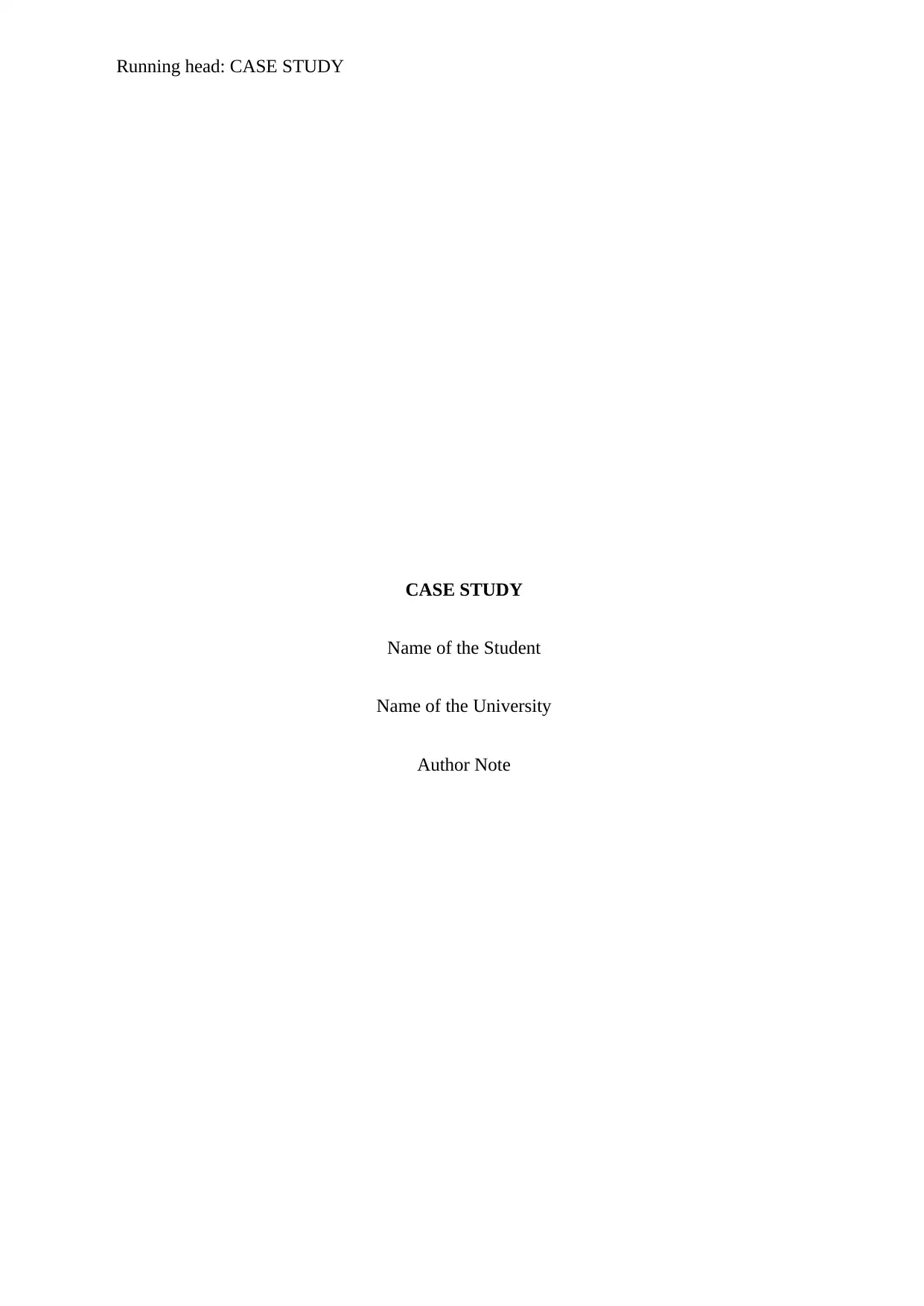
Running head: CASE STUDY
CASE STUDY
Name of the Student
Name of the University
Author Note
CASE STUDY
Name of the Student
Name of the University
Author Note
Paraphrase This Document
Need a fresh take? Get an instant paraphrase of this document with our AI Paraphraser
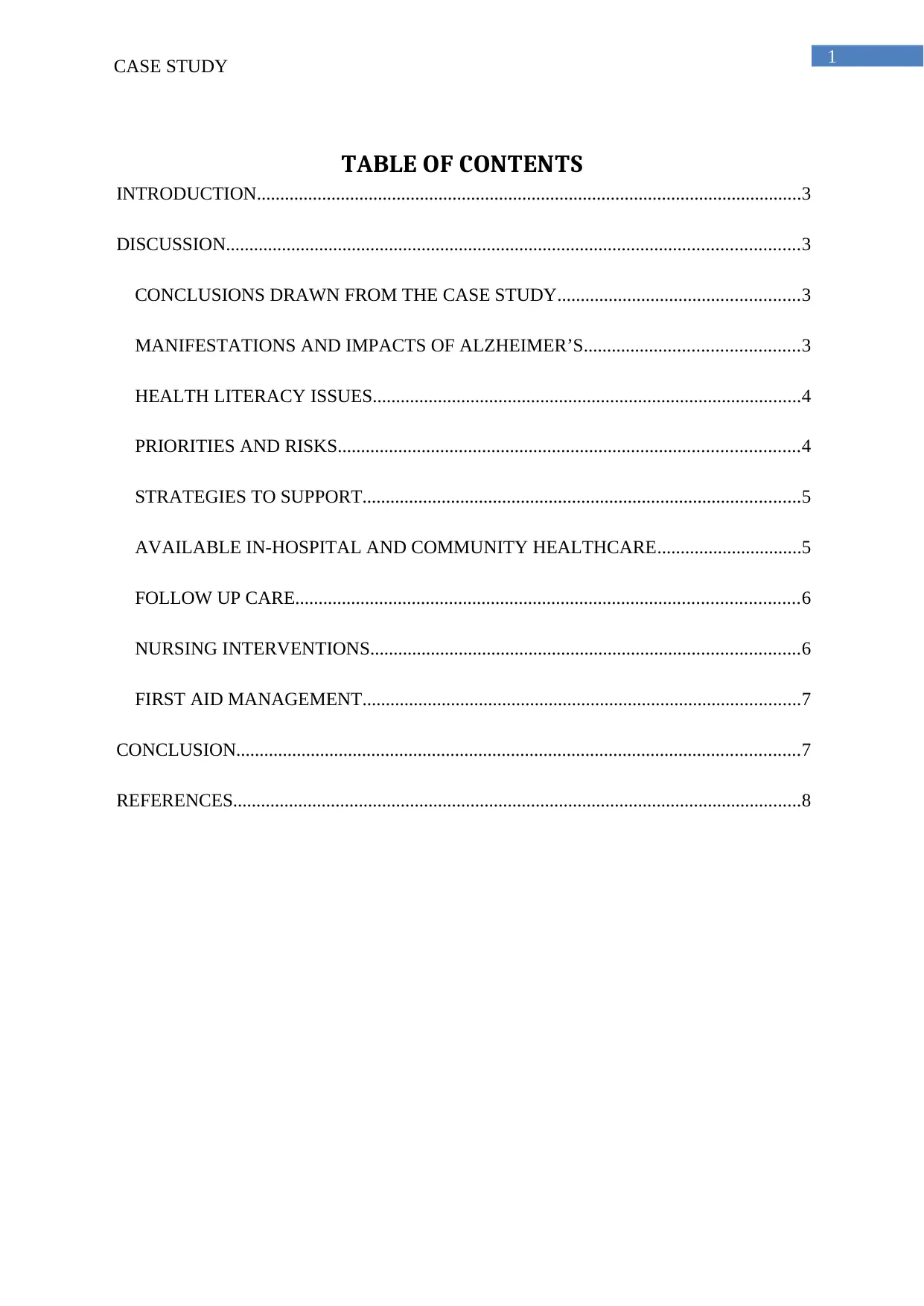
1
CASE STUDY
TABLE OF CONTENTS
INTRODUCTION.....................................................................................................................3
DISCUSSION...........................................................................................................................3
CONCLUSIONS DRAWN FROM THE CASE STUDY....................................................3
MANIFESTATIONS AND IMPACTS OF ALZHEIMER’S..............................................3
HEALTH LITERACY ISSUES............................................................................................4
PRIORITIES AND RISKS...................................................................................................4
STRATEGIES TO SUPPORT..............................................................................................5
AVAILABLE IN-HOSPITAL AND COMMUNITY HEALTHCARE...............................5
FOLLOW UP CARE............................................................................................................6
NURSING INTERVENTIONS............................................................................................6
FIRST AID MANAGEMENT..............................................................................................7
CONCLUSION.........................................................................................................................7
REFERENCES..........................................................................................................................8
CASE STUDY
TABLE OF CONTENTS
INTRODUCTION.....................................................................................................................3
DISCUSSION...........................................................................................................................3
CONCLUSIONS DRAWN FROM THE CASE STUDY....................................................3
MANIFESTATIONS AND IMPACTS OF ALZHEIMER’S..............................................3
HEALTH LITERACY ISSUES............................................................................................4
PRIORITIES AND RISKS...................................................................................................4
STRATEGIES TO SUPPORT..............................................................................................5
AVAILABLE IN-HOSPITAL AND COMMUNITY HEALTHCARE...............................5
FOLLOW UP CARE............................................................................................................6
NURSING INTERVENTIONS............................................................................................6
FIRST AID MANAGEMENT..............................................................................................7
CONCLUSION.........................................................................................................................7
REFERENCES..........................................................................................................................8
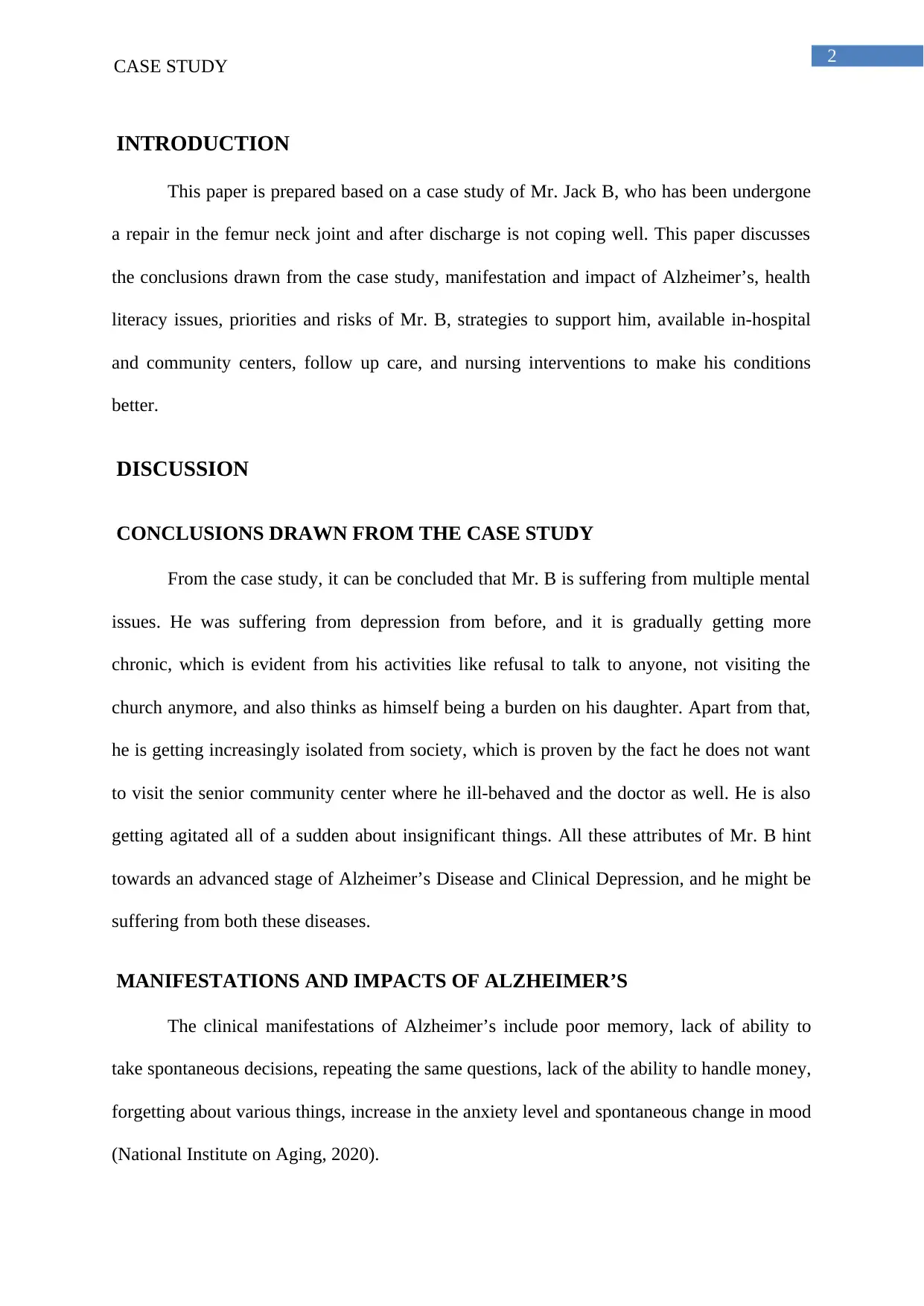
2
CASE STUDY
INTRODUCTION
This paper is prepared based on a case study of Mr. Jack B, who has been undergone
a repair in the femur neck joint and after discharge is not coping well. This paper discusses
the conclusions drawn from the case study, manifestation and impact of Alzheimer’s, health
literacy issues, priorities and risks of Mr. B, strategies to support him, available in-hospital
and community centers, follow up care, and nursing interventions to make his conditions
better.
DISCUSSION
CONCLUSIONS DRAWN FROM THE CASE STUDY
From the case study, it can be concluded that Mr. B is suffering from multiple mental
issues. He was suffering from depression from before, and it is gradually getting more
chronic, which is evident from his activities like refusal to talk to anyone, not visiting the
church anymore, and also thinks as himself being a burden on his daughter. Apart from that,
he is getting increasingly isolated from society, which is proven by the fact he does not want
to visit the senior community center where he ill-behaved and the doctor as well. He is also
getting agitated all of a sudden about insignificant things. All these attributes of Mr. B hint
towards an advanced stage of Alzheimer’s Disease and Clinical Depression, and he might be
suffering from both these diseases.
MANIFESTATIONS AND IMPACTS OF ALZHEIMER’S
The clinical manifestations of Alzheimer’s include poor memory, lack of ability to
take spontaneous decisions, repeating the same questions, lack of the ability to handle money,
forgetting about various things, increase in the anxiety level and spontaneous change in mood
(National Institute on Aging, 2020).
CASE STUDY
INTRODUCTION
This paper is prepared based on a case study of Mr. Jack B, who has been undergone
a repair in the femur neck joint and after discharge is not coping well. This paper discusses
the conclusions drawn from the case study, manifestation and impact of Alzheimer’s, health
literacy issues, priorities and risks of Mr. B, strategies to support him, available in-hospital
and community centers, follow up care, and nursing interventions to make his conditions
better.
DISCUSSION
CONCLUSIONS DRAWN FROM THE CASE STUDY
From the case study, it can be concluded that Mr. B is suffering from multiple mental
issues. He was suffering from depression from before, and it is gradually getting more
chronic, which is evident from his activities like refusal to talk to anyone, not visiting the
church anymore, and also thinks as himself being a burden on his daughter. Apart from that,
he is getting increasingly isolated from society, which is proven by the fact he does not want
to visit the senior community center where he ill-behaved and the doctor as well. He is also
getting agitated all of a sudden about insignificant things. All these attributes of Mr. B hint
towards an advanced stage of Alzheimer’s Disease and Clinical Depression, and he might be
suffering from both these diseases.
MANIFESTATIONS AND IMPACTS OF ALZHEIMER’S
The clinical manifestations of Alzheimer’s include poor memory, lack of ability to
take spontaneous decisions, repeating the same questions, lack of the ability to handle money,
forgetting about various things, increase in the anxiety level and spontaneous change in mood
(National Institute on Aging, 2020).
⊘ This is a preview!⊘
Do you want full access?
Subscribe today to unlock all pages.

Trusted by 1+ million students worldwide
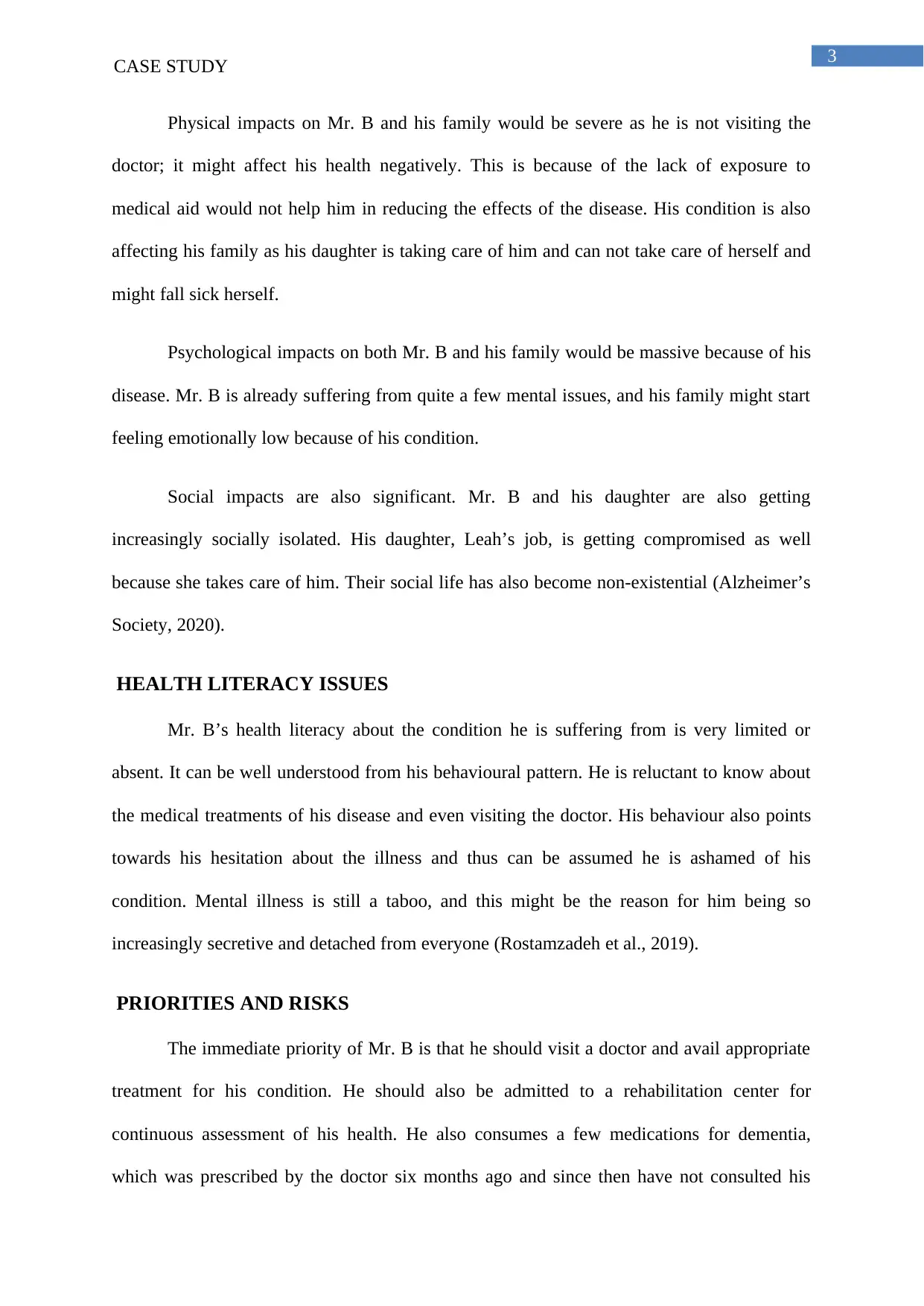
3
CASE STUDY
Physical impacts on Mr. B and his family would be severe as he is not visiting the
doctor; it might affect his health negatively. This is because of the lack of exposure to
medical aid would not help him in reducing the effects of the disease. His condition is also
affecting his family as his daughter is taking care of him and can not take care of herself and
might fall sick herself.
Psychological impacts on both Mr. B and his family would be massive because of his
disease. Mr. B is already suffering from quite a few mental issues, and his family might start
feeling emotionally low because of his condition.
Social impacts are also significant. Mr. B and his daughter are also getting
increasingly socially isolated. His daughter, Leah’s job, is getting compromised as well
because she takes care of him. Their social life has also become non-existential (Alzheimer’s
Society, 2020).
HEALTH LITERACY ISSUES
Mr. B’s health literacy about the condition he is suffering from is very limited or
absent. It can be well understood from his behavioural pattern. He is reluctant to know about
the medical treatments of his disease and even visiting the doctor. His behaviour also points
towards his hesitation about the illness and thus can be assumed he is ashamed of his
condition. Mental illness is still a taboo, and this might be the reason for him being so
increasingly secretive and detached from everyone (Rostamzadeh et al., 2019).
PRIORITIES AND RISKS
The immediate priority of Mr. B is that he should visit a doctor and avail appropriate
treatment for his condition. He should also be admitted to a rehabilitation center for
continuous assessment of his health. He also consumes a few medications for dementia,
which was prescribed by the doctor six months ago and since then have not consulted his
CASE STUDY
Physical impacts on Mr. B and his family would be severe as he is not visiting the
doctor; it might affect his health negatively. This is because of the lack of exposure to
medical aid would not help him in reducing the effects of the disease. His condition is also
affecting his family as his daughter is taking care of him and can not take care of herself and
might fall sick herself.
Psychological impacts on both Mr. B and his family would be massive because of his
disease. Mr. B is already suffering from quite a few mental issues, and his family might start
feeling emotionally low because of his condition.
Social impacts are also significant. Mr. B and his daughter are also getting
increasingly socially isolated. His daughter, Leah’s job, is getting compromised as well
because she takes care of him. Their social life has also become non-existential (Alzheimer’s
Society, 2020).
HEALTH LITERACY ISSUES
Mr. B’s health literacy about the condition he is suffering from is very limited or
absent. It can be well understood from his behavioural pattern. He is reluctant to know about
the medical treatments of his disease and even visiting the doctor. His behaviour also points
towards his hesitation about the illness and thus can be assumed he is ashamed of his
condition. Mental illness is still a taboo, and this might be the reason for him being so
increasingly secretive and detached from everyone (Rostamzadeh et al., 2019).
PRIORITIES AND RISKS
The immediate priority of Mr. B is that he should visit a doctor and avail appropriate
treatment for his condition. He should also be admitted to a rehabilitation center for
continuous assessment of his health. He also consumes a few medications for dementia,
which was prescribed by the doctor six months ago and since then have not consulted his
Paraphrase This Document
Need a fresh take? Get an instant paraphrase of this document with our AI Paraphraser
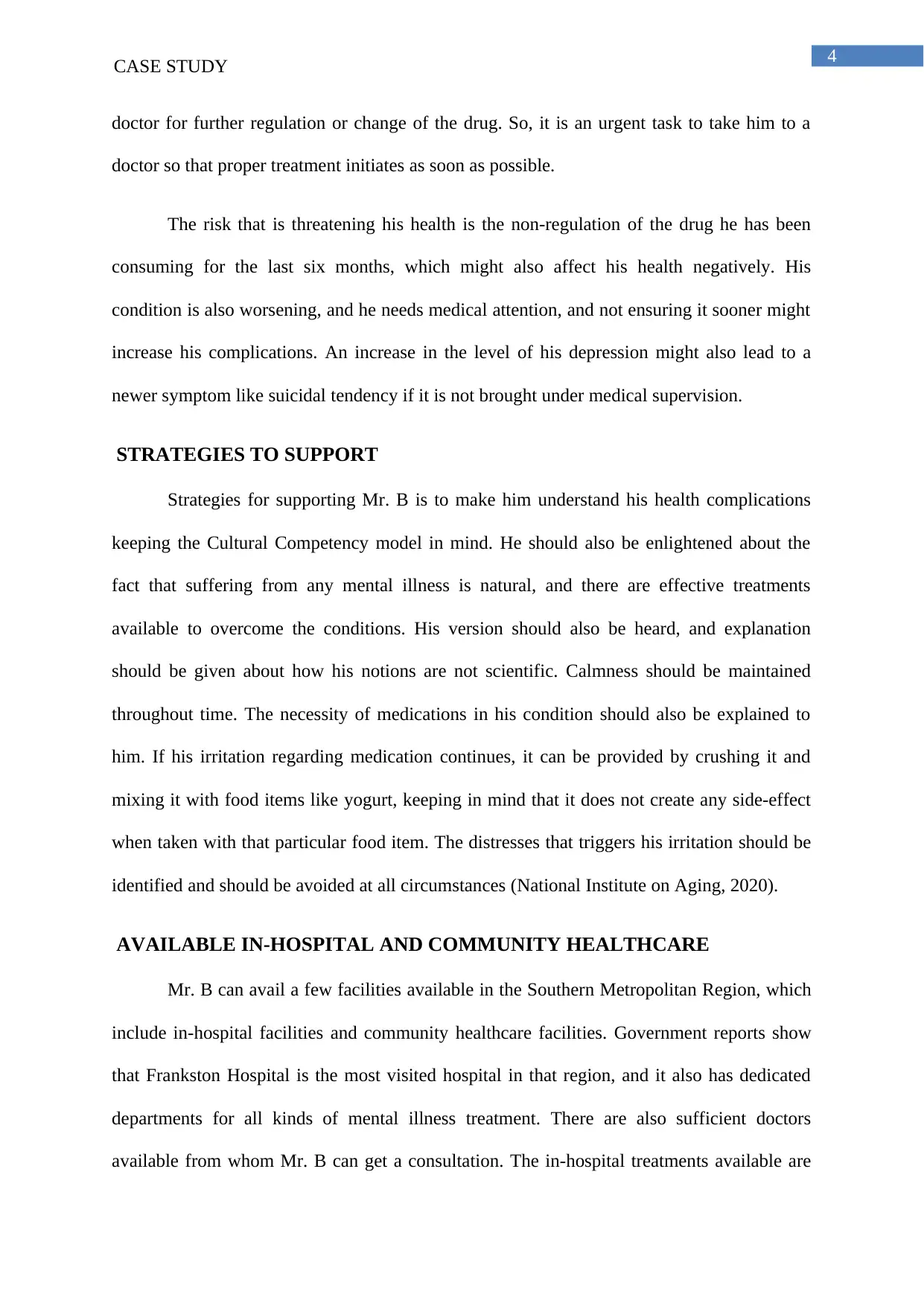
4
CASE STUDY
doctor for further regulation or change of the drug. So, it is an urgent task to take him to a
doctor so that proper treatment initiates as soon as possible.
The risk that is threatening his health is the non-regulation of the drug he has been
consuming for the last six months, which might also affect his health negatively. His
condition is also worsening, and he needs medical attention, and not ensuring it sooner might
increase his complications. An increase in the level of his depression might also lead to a
newer symptom like suicidal tendency if it is not brought under medical supervision.
STRATEGIES TO SUPPORT
Strategies for supporting Mr. B is to make him understand his health complications
keeping the Cultural Competency model in mind. He should also be enlightened about the
fact that suffering from any mental illness is natural, and there are effective treatments
available to overcome the conditions. His version should also be heard, and explanation
should be given about how his notions are not scientific. Calmness should be maintained
throughout time. The necessity of medications in his condition should also be explained to
him. If his irritation regarding medication continues, it can be provided by crushing it and
mixing it with food items like yogurt, keeping in mind that it does not create any side-effect
when taken with that particular food item. The distresses that triggers his irritation should be
identified and should be avoided at all circumstances (National Institute on Aging, 2020).
AVAILABLE IN-HOSPITAL AND COMMUNITY HEALTHCARE
Mr. B can avail a few facilities available in the Southern Metropolitan Region, which
include in-hospital facilities and community healthcare facilities. Government reports show
that Frankston Hospital is the most visited hospital in that region, and it also has dedicated
departments for all kinds of mental illness treatment. There are also sufficient doctors
available from whom Mr. B can get a consultation. The in-hospital treatments available are
CASE STUDY
doctor for further regulation or change of the drug. So, it is an urgent task to take him to a
doctor so that proper treatment initiates as soon as possible.
The risk that is threatening his health is the non-regulation of the drug he has been
consuming for the last six months, which might also affect his health negatively. His
condition is also worsening, and he needs medical attention, and not ensuring it sooner might
increase his complications. An increase in the level of his depression might also lead to a
newer symptom like suicidal tendency if it is not brought under medical supervision.
STRATEGIES TO SUPPORT
Strategies for supporting Mr. B is to make him understand his health complications
keeping the Cultural Competency model in mind. He should also be enlightened about the
fact that suffering from any mental illness is natural, and there are effective treatments
available to overcome the conditions. His version should also be heard, and explanation
should be given about how his notions are not scientific. Calmness should be maintained
throughout time. The necessity of medications in his condition should also be explained to
him. If his irritation regarding medication continues, it can be provided by crushing it and
mixing it with food items like yogurt, keeping in mind that it does not create any side-effect
when taken with that particular food item. The distresses that triggers his irritation should be
identified and should be avoided at all circumstances (National Institute on Aging, 2020).
AVAILABLE IN-HOSPITAL AND COMMUNITY HEALTHCARE
Mr. B can avail a few facilities available in the Southern Metropolitan Region, which
include in-hospital facilities and community healthcare facilities. Government reports show
that Frankston Hospital is the most visited hospital in that region, and it also has dedicated
departments for all kinds of mental illness treatment. There are also sufficient doctors
available from whom Mr. B can get a consultation. The in-hospital treatments available are
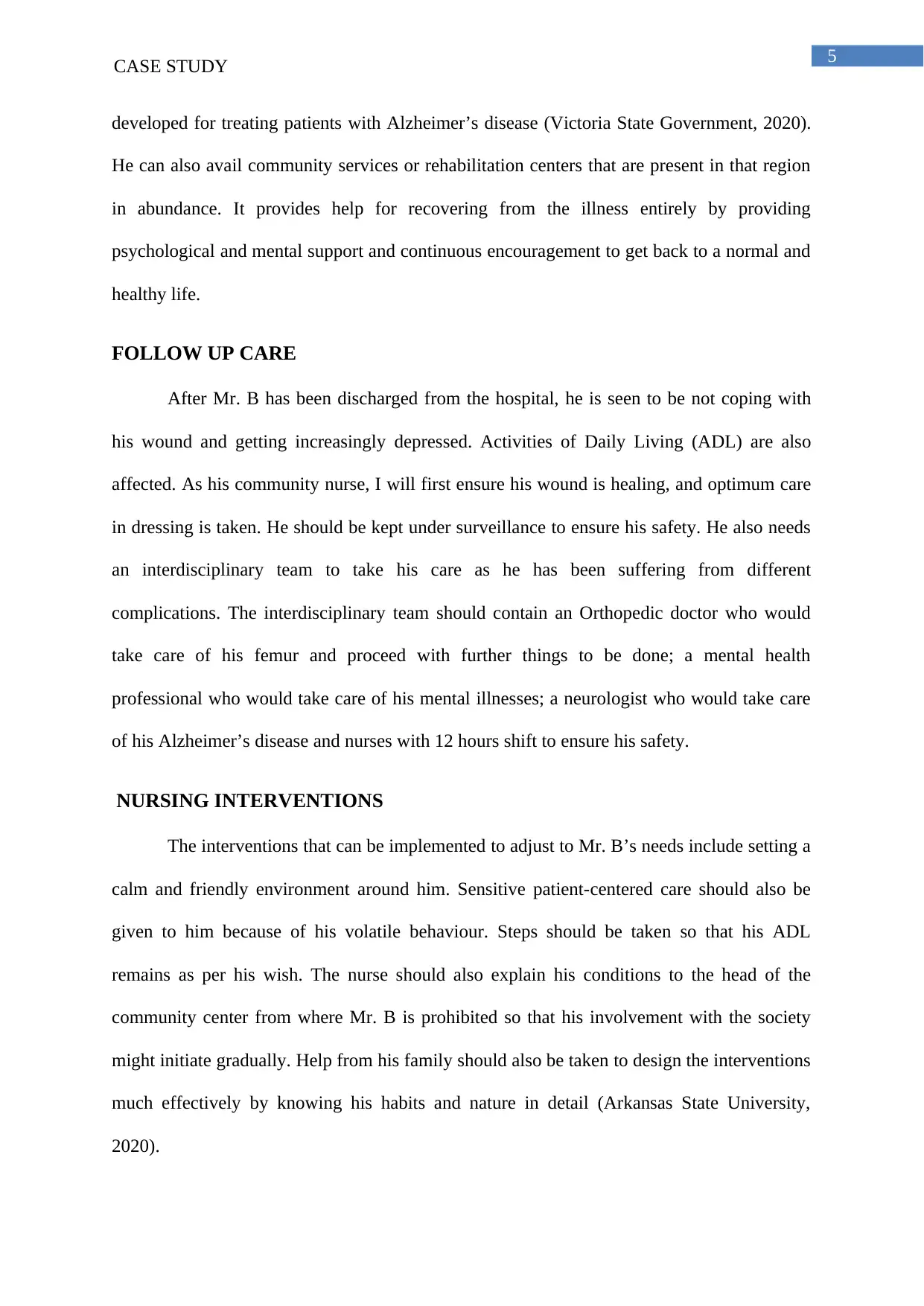
5
CASE STUDY
developed for treating patients with Alzheimer’s disease (Victoria State Government, 2020).
He can also avail community services or rehabilitation centers that are present in that region
in abundance. It provides help for recovering from the illness entirely by providing
psychological and mental support and continuous encouragement to get back to a normal and
healthy life.
FOLLOW UP CARE
After Mr. B has been discharged from the hospital, he is seen to be not coping with
his wound and getting increasingly depressed. Activities of Daily Living (ADL) are also
affected. As his community nurse, I will first ensure his wound is healing, and optimum care
in dressing is taken. He should be kept under surveillance to ensure his safety. He also needs
an interdisciplinary team to take his care as he has been suffering from different
complications. The interdisciplinary team should contain an Orthopedic doctor who would
take care of his femur and proceed with further things to be done; a mental health
professional who would take care of his mental illnesses; a neurologist who would take care
of his Alzheimer’s disease and nurses with 12 hours shift to ensure his safety.
NURSING INTERVENTIONS
The interventions that can be implemented to adjust to Mr. B’s needs include setting a
calm and friendly environment around him. Sensitive patient-centered care should also be
given to him because of his volatile behaviour. Steps should be taken so that his ADL
remains as per his wish. The nurse should also explain his conditions to the head of the
community center from where Mr. B is prohibited so that his involvement with the society
might initiate gradually. Help from his family should also be taken to design the interventions
much effectively by knowing his habits and nature in detail (Arkansas State University,
2020).
CASE STUDY
developed for treating patients with Alzheimer’s disease (Victoria State Government, 2020).
He can also avail community services or rehabilitation centers that are present in that region
in abundance. It provides help for recovering from the illness entirely by providing
psychological and mental support and continuous encouragement to get back to a normal and
healthy life.
FOLLOW UP CARE
After Mr. B has been discharged from the hospital, he is seen to be not coping with
his wound and getting increasingly depressed. Activities of Daily Living (ADL) are also
affected. As his community nurse, I will first ensure his wound is healing, and optimum care
in dressing is taken. He should be kept under surveillance to ensure his safety. He also needs
an interdisciplinary team to take his care as he has been suffering from different
complications. The interdisciplinary team should contain an Orthopedic doctor who would
take care of his femur and proceed with further things to be done; a mental health
professional who would take care of his mental illnesses; a neurologist who would take care
of his Alzheimer’s disease and nurses with 12 hours shift to ensure his safety.
NURSING INTERVENTIONS
The interventions that can be implemented to adjust to Mr. B’s needs include setting a
calm and friendly environment around him. Sensitive patient-centered care should also be
given to him because of his volatile behaviour. Steps should be taken so that his ADL
remains as per his wish. The nurse should also explain his conditions to the head of the
community center from where Mr. B is prohibited so that his involvement with the society
might initiate gradually. Help from his family should also be taken to design the interventions
much effectively by knowing his habits and nature in detail (Arkansas State University,
2020).
⊘ This is a preview!⊘
Do you want full access?
Subscribe today to unlock all pages.

Trusted by 1+ million students worldwide
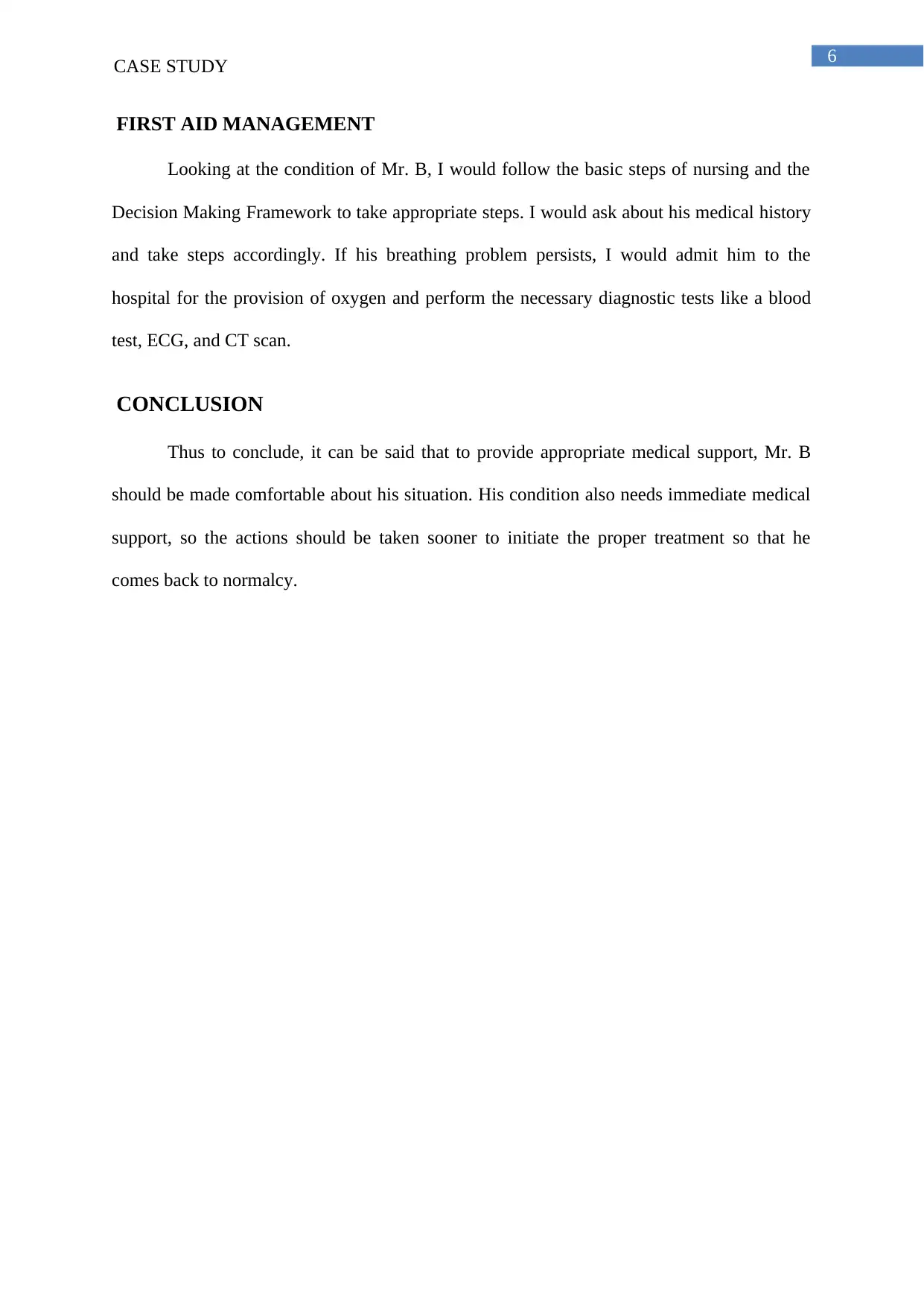
6
CASE STUDY
FIRST AID MANAGEMENT
Looking at the condition of Mr. B, I would follow the basic steps of nursing and the
Decision Making Framework to take appropriate steps. I would ask about his medical history
and take steps accordingly. If his breathing problem persists, I would admit him to the
hospital for the provision of oxygen and perform the necessary diagnostic tests like a blood
test, ECG, and CT scan.
CONCLUSION
Thus to conclude, it can be said that to provide appropriate medical support, Mr. B
should be made comfortable about his situation. His condition also needs immediate medical
support, so the actions should be taken sooner to initiate the proper treatment so that he
comes back to normalcy.
CASE STUDY
FIRST AID MANAGEMENT
Looking at the condition of Mr. B, I would follow the basic steps of nursing and the
Decision Making Framework to take appropriate steps. I would ask about his medical history
and take steps accordingly. If his breathing problem persists, I would admit him to the
hospital for the provision of oxygen and perform the necessary diagnostic tests like a blood
test, ECG, and CT scan.
CONCLUSION
Thus to conclude, it can be said that to provide appropriate medical support, Mr. B
should be made comfortable about his situation. His condition also needs immediate medical
support, so the actions should be taken sooner to initiate the proper treatment so that he
comes back to normalcy.
Paraphrase This Document
Need a fresh take? Get an instant paraphrase of this document with our AI Paraphraser
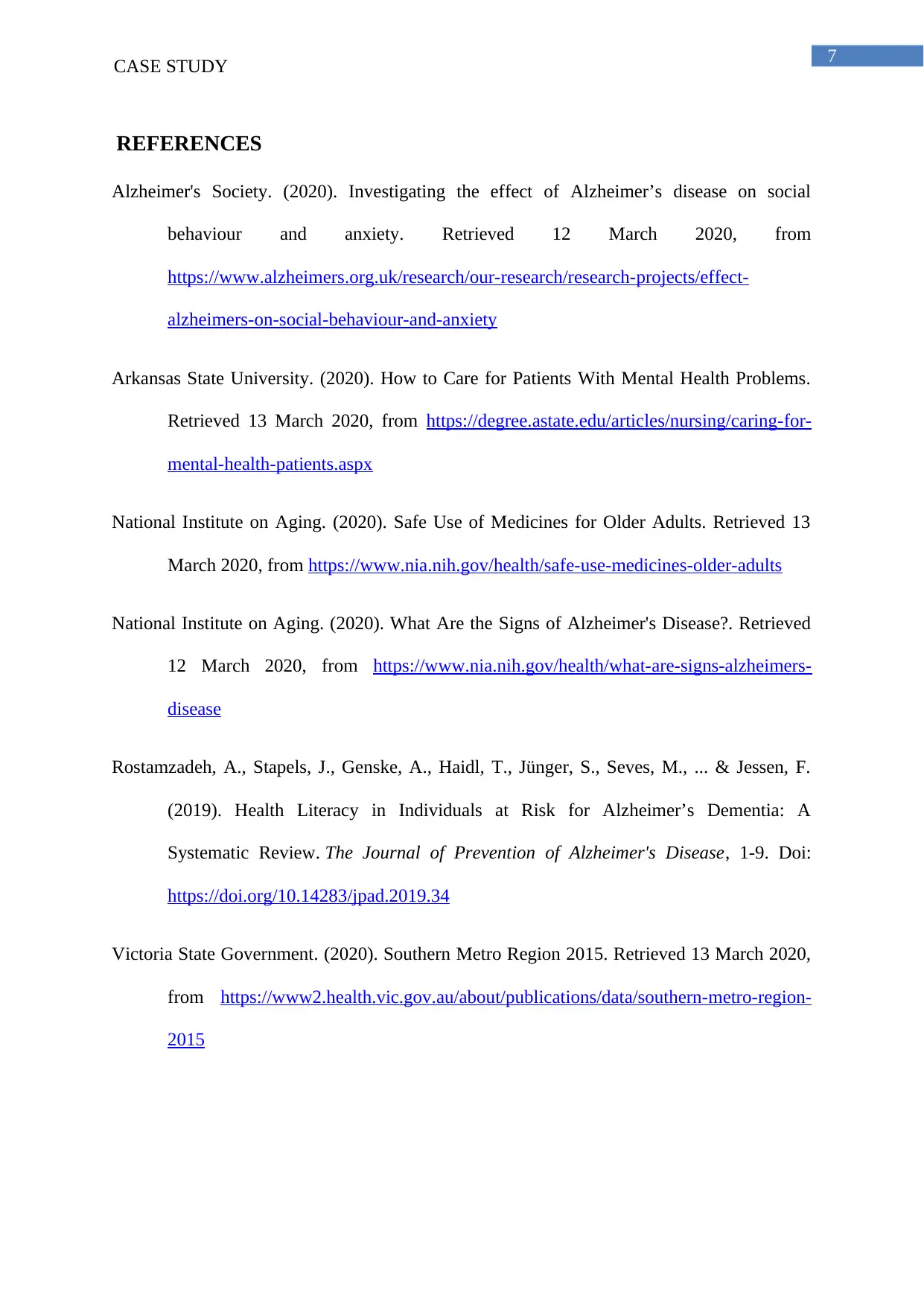
7
CASE STUDY
REFERENCES
Alzheimer's Society. (2020). Investigating the effect of Alzheimer’s disease on social
behaviour and anxiety. Retrieved 12 March 2020, from
https://www.alzheimers.org.uk/research/our-research/research-projects/effect-
alzheimers-on-social-behaviour-and-anxiety
Arkansas State University. (2020). How to Care for Patients With Mental Health Problems.
Retrieved 13 March 2020, from https://degree.astate.edu/articles/nursing/caring-for-
mental-health-patients.aspx
National Institute on Aging. (2020). Safe Use of Medicines for Older Adults. Retrieved 13
March 2020, from https://www.nia.nih.gov/health/safe-use-medicines-older-adults
National Institute on Aging. (2020). What Are the Signs of Alzheimer's Disease?. Retrieved
12 March 2020, from https://www.nia.nih.gov/health/what-are-signs-alzheimers-
disease
Rostamzadeh, A., Stapels, J., Genske, A., Haidl, T., Jünger, S., Seves, M., ... & Jessen, F.
(2019). Health Literacy in Individuals at Risk for Alzheimer’s Dementia: A
Systematic Review. The Journal of Prevention of Alzheimer's Disease, 1-9. Doi:
https://doi.org/10.14283/jpad.2019.34
Victoria State Government. (2020). Southern Metro Region 2015. Retrieved 13 March 2020,
from https://www2.health.vic.gov.au/about/publications/data/southern-metro-region-
2015
CASE STUDY
REFERENCES
Alzheimer's Society. (2020). Investigating the effect of Alzheimer’s disease on social
behaviour and anxiety. Retrieved 12 March 2020, from
https://www.alzheimers.org.uk/research/our-research/research-projects/effect-
alzheimers-on-social-behaviour-and-anxiety
Arkansas State University. (2020). How to Care for Patients With Mental Health Problems.
Retrieved 13 March 2020, from https://degree.astate.edu/articles/nursing/caring-for-
mental-health-patients.aspx
National Institute on Aging. (2020). Safe Use of Medicines for Older Adults. Retrieved 13
March 2020, from https://www.nia.nih.gov/health/safe-use-medicines-older-adults
National Institute on Aging. (2020). What Are the Signs of Alzheimer's Disease?. Retrieved
12 March 2020, from https://www.nia.nih.gov/health/what-are-signs-alzheimers-
disease
Rostamzadeh, A., Stapels, J., Genske, A., Haidl, T., Jünger, S., Seves, M., ... & Jessen, F.
(2019). Health Literacy in Individuals at Risk for Alzheimer’s Dementia: A
Systematic Review. The Journal of Prevention of Alzheimer's Disease, 1-9. Doi:
https://doi.org/10.14283/jpad.2019.34
Victoria State Government. (2020). Southern Metro Region 2015. Retrieved 13 March 2020,
from https://www2.health.vic.gov.au/about/publications/data/southern-metro-region-
2015

8
CASE STUDY
CASE STUDY
⊘ This is a preview!⊘
Do you want full access?
Subscribe today to unlock all pages.

Trusted by 1+ million students worldwide
1 out of 9
Related Documents
Your All-in-One AI-Powered Toolkit for Academic Success.
+13062052269
info@desklib.com
Available 24*7 on WhatsApp / Email
![[object Object]](/_next/static/media/star-bottom.7253800d.svg)
Unlock your academic potential
Copyright © 2020–2026 A2Z Services. All Rights Reserved. Developed and managed by ZUCOL.




